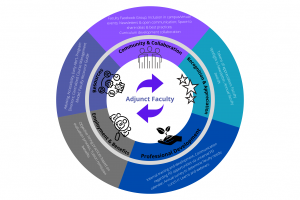Model of Faculty Support
With adjunct faculty playing an integral role in our SOUL model, we prioritize, value, and intentionally invest in the professional development and engagement of our faculty. Our ecosystem approach to faculty support is designed to cultivate a socially just academic labor for adjunct faculty, in alignment with our socially just student-centric mission. This section of the text will describe our efforts to support, develop and advance our adjunct faculty through collaboration, wrap-around supports, and professional development opportunities.
The following graphic highlights the interplay among our faculty, our community, and our available resources. Our ongoing efforts to collect feedback from faculty allows us to engage in continuous improvement in order to ensure that we are meeting the needs of our faculty. We strive to cultivate a community among our faculty, seeking opportunities to foster collaboration, peer-to-peer teaching and learning, and recognition of all of the great work accomplished by our faculty.

Community and Collaboration
We aim to promote a community of learners and leaders. We offer the following avenues of promoting team-building, community, and collaboration:
- Invitation to end-of-year events: Commencement, Rose Ceremony, and Nursing Pinning Ceremony
- Webinars with small groups from the Bay Path community
- University-wide newsletters
- Curriculum development opportunities as (paid) contracted Subject Matter Experts (SME)
- Ongoing solicitation of feedback through a Course Feedback Form and Annual Faculty Survey
Recognition and Appreciation
We take pride in the good work our faculty produce and like to recognize that as often as possible. We have several avenues of highlighting high-quality instructors:
- Faculty may receive a “token of thanks” for going above and beyond expectations.
- Our Advising team sends around a student newsletter, including a “faculty spotlight” to highlight instructor accolades and achievements.
- We have an annual adjunct award process for students and staff to vote for instructors deserving of recognition. The Faculty Development Committee, in collaboration with Program Directors, meets to decide on three winners; each of whom receives a monetary prize and formal recognition at the annual Rose Ceremony.
Professional Development
In addition to our internal training opportunities, we offer internal webinars, lunch and learns, sharing of scholarship and free professional development opportunities, and information from professional organizations in which we have an institutional membership (OLC, EDUCAUSE, NERCOMP, etc). We have created a live Professional Development calendar so that we can easily disseminate information regarding both internal and external professional development opportunities. In recognition of the scholarship and professional development our instructors do beyond what the university provides, we collect this information annually during the evaluation period.
Employment and Benefits
We recognize our adjuncts are practitioners and scholars in their respective fields. We partner with our instructors to provide ad-hoc methods of promoting expertise to our community through each academic year. To promote the ongoing growth and development of our instructors, we offer the following opportunities:
- Part-time Lead Adjunct Faculty Appointments
- Full-time Senior Lead Faculty Appointments
- Subject-Matter-Expert Course Design Contract Appointments
- Opportunities to review courses for QA during course reviews
- Opportunities to participate in program review and assessment reporting conversations
- Opportunities to mentor new instructors
- Opportunities to engage with the wider BPU community at the Women’s Leadership Conference
- Opportunities to design and develop training materials for incoming instructors
Resources
Faculty gain access to the new faculty training course (SOUL Connect for Educators) upon hire, which aims to orient new faculty to our model, the tools we use, and the accelerated format in which we operate. New faculty receive mentorship from our Faculty Development Coordinator, as well as receive helpful feedback to aid in their growth through our faculty evaluation process. Through our orientation program, new faculty are introduced to the standard evaluation rubric to ensure transparency and clear expectations. In addition to the support provided by our Faculty Development Coordinator, faculty will also receive ongoing outreach and assistance from their Program Director. Additional resources include advanced access to course content; access to this Teaching and Learning Handbook; access to support services including accessibility, academic technology, the academic team, advising, library, and IT support.